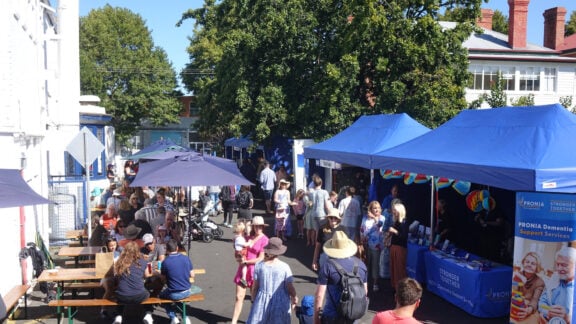Housing affordability and access to housing have dominated to election day. Two competing policies are in the spotlight. The Liberal National Party (LNP) promises a mortgage interest deduction for first home buyers as the Leader of the Coalition told Neos Kosmos a fortnight ago, they intend to “spend $5 billion to contribute to 500,000 lots of land” as Dutton said, “we’ll pay for council infrastructure – sewage, water, roads – so that we can increase housing supply.”
Dutton also wants young buyers to dip into $50,000 from superannuation for a deposit, which on the sale of the home, the funds are returned to super. Not a bad scheme – however, someone young will not doubt have less in super compared to someone in middle life. Also, Capital Gains Tax (CGT) could become the –almost invisible yet yet nasty and dangerous –mosquito bite in the plan.
Prime Minister Anthony Albanese’s Labor, meanwhile, backs a 5 per cent deposit scheme backed by a government guarantee under the Home Guarantee Scheme (HGS) and Help to Buy schemes. The government, as Housing Minister Clare O’Neil said in Neos Kosmos a few weeks ago, “the government now comes in as the bank of mum and dad.”
Labor’s home deposit scheme and the government as a mum and dad bank
Fast track to ownership or a debt trap?
Let’s try and make some sense of all this; Labor’s 5 per cent deposit scheme is simpler, however there are higher upfront repayments – not great when cost-of-living is the big gorilla. Government low-interest loans help first-home buyers by offering smaller repayments and allowing for a smaller deposit, making home ownership more accessible. Fixed rates also provide stability, and over time, buyers can build equity if property values rise. Another challenge to Labor’s proposed policy is the unrealised
Government loans can drive up house prices due to increased demand, and buyers with small deposits may face higher debt. If property values fall, they risk negative equity. Repayment stress can also occur if financial situations change or rates rise. Additionally, limited lender options and mortgage insurance costs can add to the financial burden. Capital Gains Tax for super funds, as the Greens will be pushing from a cap of $3 million to $2 million in a probable minority Labor government. While these loans offer an opportunity to enter the market, buyers should weigh the benefits against the potential risks.
Government loans can drive up house prices due to increased demand, and buyers with small deposits may face higher debt. If property values fall, they risk negative equity.
This is the good part
The policy enables eligible buyers to enter the housing market with just a 5 per cent deposit, while the government guarantees the remaining 15 per cent, removing the need for Lenders Mortgage Insurance (LMI). It also applies to all property types, including established homes, there are no income caps and no requirement to dip into super.
So, if a property costs $800,000 and you put down a 5 per cent deposit ($40,000), the loan would be $760,000. Monthly repayments, based on a 4.5 per cent interest rate, would be approximately $3,850.
Buyers can access the market faster but will face higher monthly repayments due to the larger loan, and receive no tax deduction.
Hidden trap: CGT risk in the Liberal’s deduction scheme
The Liberals’ plan allows interest deductions on up to $650,000 of a new-build mortgage. This has some appeal, at least at first glance, however, it creates an unseen CGT risk. Normally, owner-occupied homes are exempt from capital gains tax. However, claiming deductions on the mortgage may change the tax status of the property, rendering part of any future capital gain taxable.
Example:
Let’s say you buy a property for $800,000 and sell it 10 years later for $1.2 million—that’s a $400,000 capital gain. If you claimed deductions for five of those years, half the gain ($200,000) becomes taxable. With the 50 per cent CGT discount, you’re taxed on $100,000. At a 37 per cent marginal tax rate, that’s about $37,000 straight to the taxman.
Unless Parliament expressly legislates to preserve the CGT exemption, thousands of first home buyers could face unexpected tax bills upon sale.
Labour’s policy does not involve any tax deductions, nor does it change the private use of the property. As a result, the home continues to qualify for the full CGT exemption, ensuring no capital gains tax liability arises in the future.
Head-to-head comparison
Under the Liberal plan, homebuyers could deduct mortgage interest—up to $650,000—and even dip into their superannuation, taking out up to $50,000 to buy a home. But the scheme comes with a few strings, it applies only to new builds, there are income caps, and there’s a risk of paying Capital Gains Tax if the property is sold. There’s also a potential repayment cliff after five years that could catch buyers off guard.
Labor’s 5 per cent deposit scheme doesn’t allow for mortgage interest deductions or super withdrawals, but it’s open to all types of properties, not just new ones. There are no income caps, no CGT risks, and no sudden spike in repayments after five years—though monthly repayments will be higher from day one.
Final verdict: Short-term tax relief vs long-term simplicity (kinda)
The Liberal scheme has attractive short-term tax benefits, particularly for buyers of moderately priced new builds with loans below $650,000. But the scheme introduces longer-term risks and complexities. The plan risks a repayment cliff after five years, possible Capital Gains Tax exposure, and offers little benefit to those with larger mortgages.
In contrast, Labor’s 5 per cent deposit scheme offers greater long-term predictability. It helps first home buyers access the market sooner without super withdrawals or future tax traps, but does saddle them with higher mortgage repayments from the beginning.
For first home buyers, the choice comes down to this: Short-term tax relief or long-term financial certainty.
*Tony Anamourlis is a tax law specialist in multi-national transactions, negotiating with the Commissioner of Taxation and other regulators, and Fotis Kapetopoulos is a senior journalist for Neos Kosmos and a former political adviser to the former Premier of Victoria, Ted Baillieu.









